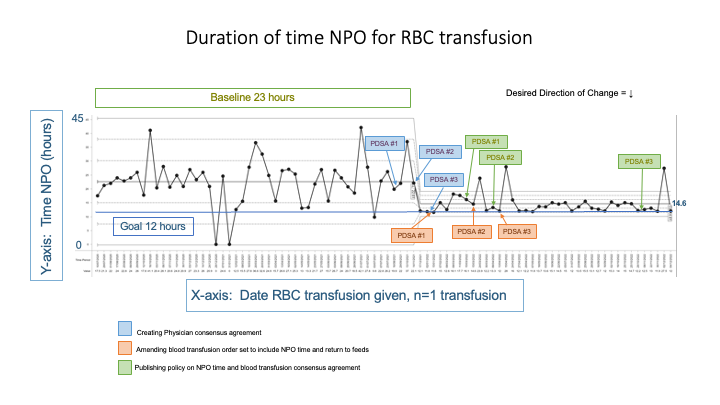Neonatal Quality Improvement
Neonatal Quality Improvement 6
212 - A quality improvement project to standardize and decrease time enteral feeds held for red blood cell transfusions without an increase in transfusion associated necrotizing enterocolitis
Publication Number: 212.44

Sarah M. Van Nostrand, DO
Neonatologist
Dayton Children's Hospital
Dayton, Ohio, United States
Presenting Author(s)
Background:
Enteral feeding during red blood cell (RBC) transfusions in preterm infants may be correlated with transfusion associated necrotizing enterocolitis (TANEC). The optimal duration to hold feeds during RBC transfusions to reduce the risk of TANEC is unknown. To reduce the risk of TANEC, in 2011 our neonatal intensive care unit (NICU) adopted the practice of stopping enteral feeds for two to four hours prior to RBC transfusions. We continued to hold feeds during the transfusion and post-transfusion and restarted feeds the next day for all infants regardless of gestational age or chronological age. This resulted in wide practice variation with feeds being held on average 23 hours and ranging from zero to 42 hours.
Objective: Decrease and standardize time infants have enteral feeds held for RBC transfusions.
Design/Methods:
A multidisciplinary team created and implemented guidelines and systemic measures, applied PDSA cycles, and standardized the practice of holding enteral feeds during RBC transfusions. Outcome measures included length of time enteral feeds held and occurrence of TANEC.
Results:
Three different interventions were initiated with multiple PDSA cycles completed over 14 months. The first intervention developed physician consensus regarding optimal time to hold enteral feeds. We decided to hold feeds for three to four hours pre-transfusion, during the transfusion, and for four to six hours post-transfusion for a goal total time to hold feeds for 12 hours. The second intervention created specific orders for holding enteral feeds during RBC transfusions. The third intervention developed a policy and guidelines for use and shared with the NICU staff. Average length of time enteral feeds held for RBC transfusions decreased from 23 hours to 14.6 hours with no incidence of TANEC.
Conclusion(s):
The process for holding enteral feeds for RBC transfusions became standardized and feeds were held for a shorter standardized duration without an increase in TANEC.

